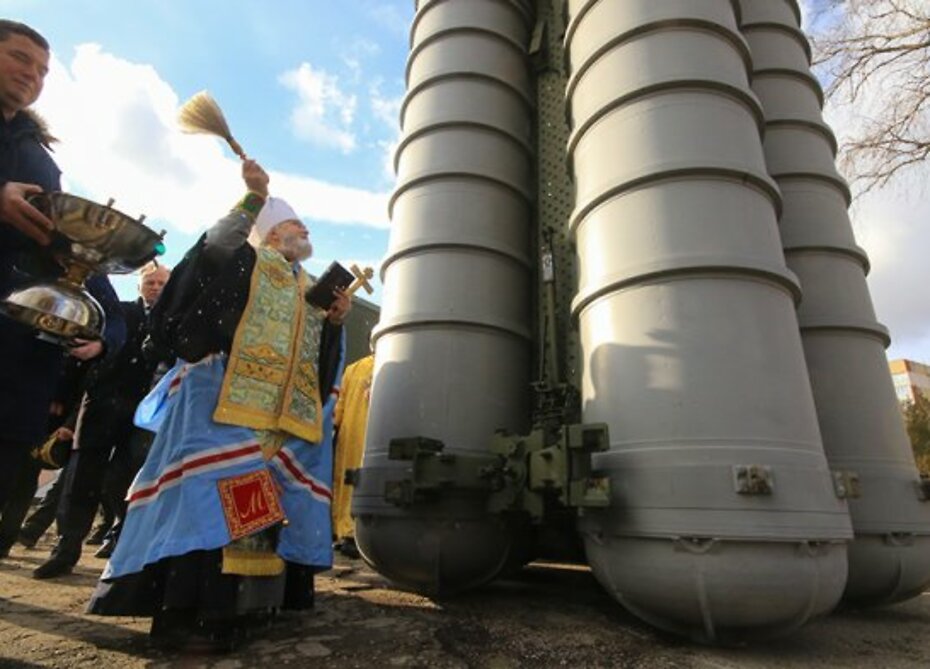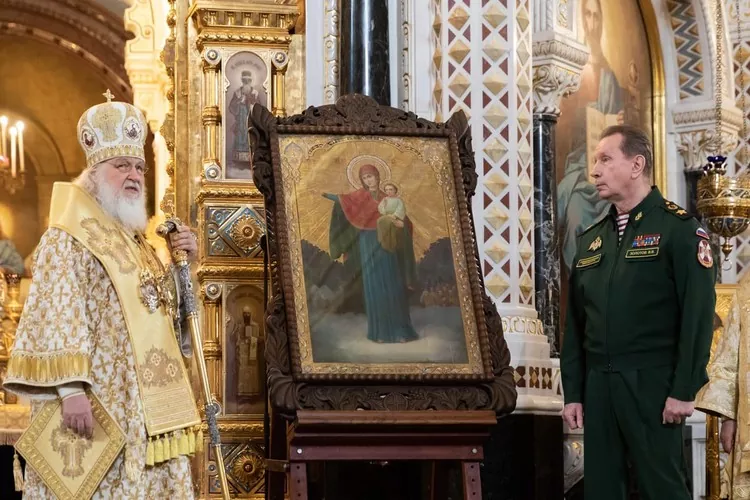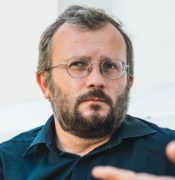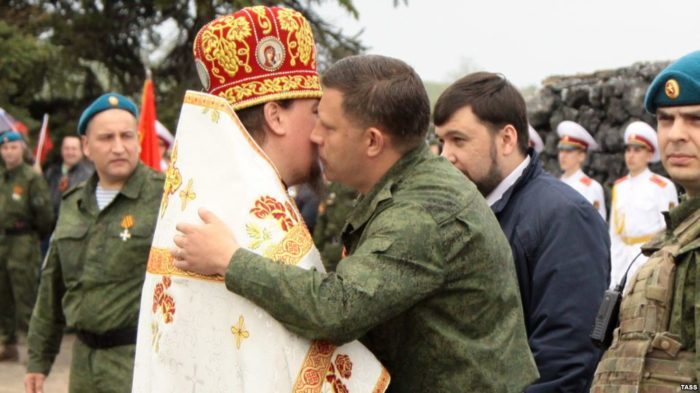Cyril Hovorun, PhD, Senior Lecturer at Stockholm School of Theology, explained to Euromaidan Press why this doctrine was developed under the auspices of the Russian Orthodox Church, how it makes the Russia of today tick, and why it should be genuinely condemned worldwide.
A recently-signed declaration of theologians condemns the teaching of the Russian World. What is this Russian World? Is it the Russian World that Vladimir Putin so often references?
Yes. The doctrine of the Russian World that the declaration condemns has its roots in the 1990s. After that, it had some significant modifications, when in the early 2000s, it was taken over by the Church. The Church has shaped it into a different kind of doctrine. This doctrine is still active and frames the Russian war in Ukraine.
And the component of ideas in this formula is exactly this doctrine of the Russian World.
That’s why the theologians who have drafted and signed the petition realize that the core of the aggression is ideological: it’s a distorted theology, a kind of hybrid of theology and ideology (ideologized theology or theologized ideology, whatever you prefer). Unfortunately, this hybrid does underpin the war.
First, this idea was formed by the Church, then the Kremlin adopted the language and the ideas as such from it. The last time that we heard from this doctrine was in the notorious speech of Putin on the eve of the war when he clearly referenced the ideas from the Russian World doctrine.

Could you briefly outline what the Russian World is?
It’s a form of exceptionalism, or nationalism. That’s why, by the way, the theologians of the declaration rightly identify the Russian World as a form of phyletism. This is a term coined by Orthodox theologians in the 19th century when they condemned different forms of nationalism. Literally, phyletism means tribalism, in other words — a form of exceptionalism that means that belonging to a tribe makes you different and exceptional.
If you expand this kind of exceptionism from tribe to a civilization, as the Russian World suggests, then you have the doctrine of the Russian World.
Essentially, the Russian World is tribalism expanded to the scale of civilization
What the proponents of the Russian world call the Russian civilization is believed to be exceptional, with a special mission from God — to save the world from itself. They see their mission as cosmic and themselves as the vehicle of the divine providence in making the world a better place. Such ideas resonate with the traditions of the Russian messianism captured, for example, by Dostoyevsky.
In their extreme forms, such ideas drive people like Putin and his followers. Many people in Russia have subscribed to this ideology: they believe that their mission is really divine, cosmic, it’s about fighting the global evil, represented by the Western countries, the US, NATO. For them, Russia is the incarnation of cosmic goodness. From this perspective, the Russian world is not just a political ideology. It’s not just a set of political ideas, as, for example, the purely political idea of the EU.
That’s why it’s important to take into consideration religion when we try to understand this war. And that’s why theologians address this war and try to explain it theologically – because without this component, one can hardly fully understand what is going on in Ukraine with the war.
How does Russia know that it’s on the holy side of things and that the rest of the world is profane? How does it justify that?
It’s certainly a delusion, and we see that the fruits of the delusion are destruction, loss of human life, human suffering to a scale unimaginable in our times.
As the Gospel says, from the fruits you will know the tree. The fruits, disastrous, murderous fruits, indicate what kind of ideology it is. Yes, the Russians believe that this ideology represents the divine truth and see themselves as acting on behalf of God. But it’s a delusion.
They have produced an idea that constitutes an intrinsic part of the Russian World doctrine: the idea of so-called “traditional values” that, so they say, represent the Christian believes. They say the West has been corrupted by liberal ideas and values, while Russia needs to save the world from those dangerous, as they say, ideas. Their “traditional values” are conservative and anti-liberal.
What the Russians believe to be a cosmic battle between Russia and the “godless” West is essentially a battle between two ideologies — the ideology of conservatism and liberalism.
In a sense, this war is a Russian version of the culture wars that the rest of the world knows very well, especially the USA.
I sometimes say that the culture wars are neither about culture, nor about wars. In the case of Ukraine, we are facing a situation when a culture war has become a real war. We are in a situation when this battle for values and ideological maxims like conservatism or liberalism has led to people taking up arms and going to protect those values.
This belief in “traditional values” makes Russians believe that their mission is holy and that they are on the side of God. Many people across the world, not only Christians but also Muslims and representatives of other religions, have been convinced to support Russia in this battle.
That’s why we see these strange alliances like between the Kremlin and some white evangelicals in the USA; we can observe sympathy to the cause of Russia and Putin in some conservative circles of the Catholic, Protestant, and other churches, even under the current circumstances of the war. We can see a convergence between Russian ideology and radical Islam, because many radical Muslims, especially supporters of Daesh in the Middle East, see Russia as fighting their common enemy, this global demon/shaitan of the West. They share the same idealistic, polarized worldview that counterposes their own values, their own country against the “godless” West. In this point, I believe, Daesh and the Kremlin are on the same page.
So it’s a global phenomenon and not just about the war in Ukraine. At the same time, it should be clarified that religion per se is not to be blamed. What we are dealing with is a distortion of religion, and that’s why some churches like the Ecumenical Patriarchate or the theologians who have signed the petition have condemned the Russian World doctrine.
We need to be very clear, it’s not about religion as such, but about the distortion of religion. And to address this problem is not to eliminate religion as such, but about restoring the orthodoxy of Orthodoxy.
So we can say that this is heresy, like the heresies of the past.
Exactly, in the language of the Orthodox tradition. This language has been used in the declaration, which states that this is a heresy. This heresy needs to be condemned.
Can we say that the ideology of the Russian World is the basis of Russia’s geopolitical actions today? And can we say that Russian chauvinism and imperialism that Ukrainians are aware of is the result of this ideology?
Maybe Russian chauvinism is not a result of this ideology, because the latter emerged later than Russian chauvinism or imperialism, but in Putin’s Russia, they converged and enhance each other. Russian chauvinism as we know it existed for centuries. It pretty much underpinned the existence of the Romanov empire. But when the Russian World was articulated in the metaphysical terms, with the idea of traditional values playing a key role in it, then the Russian chauvinism was upgraded to a new level – the level of war.
Can we say that the average Russian also shares this ideology?
Unfortunately, I believe it is so. We see calls in the West to differentiate between Putin and his circle and the rest of Russians. I understand the motivation for such differentiation because our modern civilization avoids blaming masses of people for what is going on. But in the case of Russia, I think it is very clear that Putin has the support of the majority of the population regardless of his actions.
The so-called “cultural Christianity” is the basis of such support. It is an identity-based Christianity when people identify themselves with the Church without really belonging or believing in the Church or even without believing in God. So currently, maybe up to 5% of Russians go to church, and 60-70% identify themselves as Orthodox. And those who identify themselves as Orthodox without belonging or believing, in sociology are called “cultural Christians.” They, essentially, believe in a mixture of ideology and theology, which makes them support Putin. Exactly for this reason does Putin employ this language, because he knows it would consolidate the majority of the Russians around him and his war.
Does the modern ideology of the Russian World actually have an author? We heard that Aleksandr Dugin was very influential in forming Putin’s worldview; did he take part in forming this doctrine?
Dugin is a Eurasian. The Russian World is not exactly a Eurasian ideology. Yes, they converge in many points but they are not identical. That’s why I would say that the main part in forming this ideology was played by the Church. And I believe that Patriarch Kiril [the leader of the Russian Orthodox Church] is the author of this ideology.

Why did the Church do this?
The original idea of the Russian Orthodox Church was to attract people, by filling the ideological void that emerged as a result of the collapse of the Soviet Union. When the Soviet Union collapsed, the ideology that framed the Communist regime collapsed as well. This left a void that many people felt, including Putin.
The disappointment in the Communist ideology became complete in post-Soviet Russia, and the Church saw this as an opportunity to evangelize people by attracting them to Christianity through ideology. That’s why this construct was created, which combined a mixture of theological and ideological ideas. The idea was, basically, to evangelize people, but it backfired. Instead of Christianizing the deideologized Russian population, it led to ideologizing the Christian Church, causing the opposite effect from what was expected. The Church has been ideologized and putinized as a result of this. Now the Church needs to be deputinized.
Can you tell about the predecessor of the Russian World, the phyletism that you mentioned. How did it emerge, how was it condemned, and what role did it play in the geopolitical processes of that time?
Phyletism emerged as a result of the processes of the national awakening in the 19th century, the so-called “spring of nations” that started in Western Europe and spread to the territories of the East, in the Ottoman and Russian Empires. The idea was that a nation has the ultimate value, so that the religious status of the people should be defined by their national identity. Essentially, phyletism is when the national identity is believed to be superior to the Christian identity. This has been condemned as heresy.
What we are dealing with in the Russian World is exactly the same. Just because we are the Russian World and the Russian civilization, we can define what the Church is.
That’s why, in the spirit of such exceptionism, the Russians decided to advance to Africa. Now this is a minor issue, but it was big before the war, when the Russian Church opened its churches in Africa following this idea — we are special, exceptional, we are eligible to do whatever we want in other churches, on other territories, including that of the ancient Church of Alexandria, which had been established by the Ecumenical Councils in the early Christian era.
So, this is just a symptom of the disease of phyletism that brings the national identity, in the case of the Russian World – its civilizational identity, above any other, including Christian identity and Christian belief.
So at the time, did phyletism play a role in wars, like today?
Unfortunately, it did. If you remember, the Balkan wars in 1912-1913 were waged between Orthodox nations: Serbians, Greeks, Romanians, etc. These wars were also underpinned by phyletism. So what we are facing now in Ukraine is not a new thing. It’s tragic, huge, more disastrous than the Balkan wars, but it’s in the line with the latter.
Unfortunately, the Orthodox Church did not reflect properly on the reasons for the wars that were waged in the 20th century. That’s why we have a repetition of those wars. In order to avoid a repetition of the war in Ukraine, we, theologians, need to do our homework very well, we need to deconstruct those ideologies that continue underpinning violence and war.
As part of this goal, you mentioned that it’s necessary to deputinize the Russian Orthodox Church. How does this declaration propose doing that?
I don’t have a ready recipe for that. It needs to be discussed among theologians. There should be a collective effort of many people, thinkers, and intellectuals. It needs to be an intellectual process of reflection, deconstruction, and criticism of this doctrine. The process is ongoing; it’s not that it hasn’t started, it started some time ago, and I’m happy to be a part of it from the very beginning.
The declaration you mentioned at the beginning is only one of the results of this process and I hope it’s not the last one. It should be similar to the process of denazification and detotalitarization of theology after WWII.
Western theologies, including the Catholic and Protestant ones, had been affected by the same kind of totalitarian ideas, especially in the 1930s. Some Orthodox theologians also concurred with that trend.
But the Catholic and Protestant churches did very good homework to overcome these theologies after WWII; they produced what they called “theology after Auschwitz.” We probably need a similar theology after the Ukrainian war, exactly to address the ideological basis of the war, in order to avoid a repetition of this war on the same basis.
Could you explain why the Russian World is counter-Christian, why is it against Christianity?
I think some ideas on which the Russian World bases itself resonates with the Christian beliefs, but we are dealing with abuse, distortion of those ideas, a manipulation if you want. It’s the same kind of manipulation in the case of idols substituting God.
Essentially, I believe the Russian World is a sort of idolatry. When they produce idols – resemblances of God, and venerate those idols instead of God. Those idols are the idea of civilization that substitutes the idea of the Kingdom of God. Those ideas include also the idea of traditional values, which substitute the idea of the divine love of Jesus Christ. Also, the idols include the ideology that substitutes the theology of the Church. So, we are dealing with idols. As Christians, we have to be very careful not to venerate idols, to remember the First Commandment: “Thou shalt have no other gods before me.”
What would say to people who support Russia and the Russian World because they are critical of globalization and the current situation in the world?
I would quote to them the Gospel: “For a good tree bringeth not forth corrupt fruit; neither doth a corrupt tree bring forth good fruit. For every tree is known by his own fruit.” Russia presents itself as a leader in the process of resistance to globalization on the basis of religious principles, but the result is the destruction of everything. Look at Ukraine. This war is different even from the war in the Gulf that was live filmed on CNN. This war is documented live on social media, people see the images of atrocities, of death and suffering, the moment they are happening. Look at those pictures and see where this kind of rhetoric may lead — the rhetoric of traditional values, of global resistance to globalization, whatever, this dichotomic, dualistic worldview that puts different parts of the world against each other. Look at where these ideas may lead: to destruction, suffering, and death.
Thank you very much, father Cyril, I hope your words will reach as many people as possible.

Archimandrite Cyril Hovorun, PhD, is a Senior Lecturer at Stockholm School of Theology, former Chairman of the Department for External Church Relations of the UOC MP
Related:
- The “Russian World” as a political technology used against Ukraine
- How the ‘Russian world’ concept propels Russian aggression in Ukraine
- Putin has started “solving the Ukrainian question”






